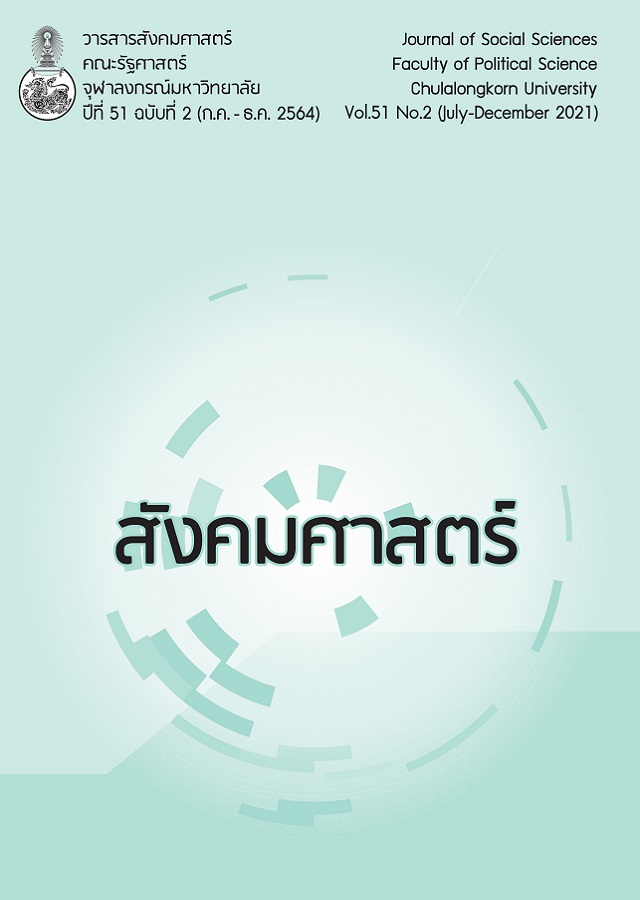Node: หน่วยประสานเครือข่ายงานด้านการพัฒนาสังคมในมุมมองทฤษฎีเครือข่าย-ผู้กระทำการ
DOI:
https://doi.org/10.61462/cujss.v51i2.684คำสำคัญ:
node, หน่วยประสานเครือข่าย, คุณลักษณะของ node, งานพัฒนาสังคม, ทฤษฎีเครือข่าย-ผู้กระทำการ, ประเทศไทยบทคัดย่อ
บทความนี้มีวัตถุประสงค์เพื่ออรรถาธิบายความเป็นมาของ node หน่วยประสานเครือข่ายงานด้านการพัฒนาสังคมในประเทศไทยและอภิปรายใน 3 ประเด็น คือ 1. บทบาทและรูปแบบการทำงาน 2. องค์ประกอบด้านคุณลักษณะของ node ประกอบด้วยคุณลักษณะด้านความรู้ ทักษะ และเจตคติต่อการทำงานพัฒนาสังคม และ 3. ความสัมพันธ์ของ node กับงานพัฒนาสังคมตามทฤษฎีเครือข่าย-ผู้กระทำการ ผลการถอดบทเรียนการทำงานของหน่วยปฏิบัติการวิจัยเพื่อการพัฒนาด้านเด็กและเยาวชน พบว่า 1. node มีบทบาทเป็นผู้สร้างการเปลี่ยนแปลงทางสังคมโดยมีรูปแบบการทำงานแบบประสานความร่วมมือกับองค์กรทางสังคม 2. node ต้องมีคุณลักษณะด้านความรู้ที่หลากหลายทั้งกว้างและลึกเชิงประเด็น มีทักษะการสื่อสารเพื่อสร้างพื้นที่การมีส่วนร่วม และมีอุดมการณ์ในการทำงานเพื่อส่งเสริมสิทธิมนุษยชนและสันติภาพ และ 3. ความสัมพันธ์สัมพัทธ์ตามแนวคิดทฤษฎีเครือข่าย-ผู้กระทำการที่ node สร้างผ่านการทำงานพัฒนาสังคมทำให้เกิดปฏิสัมพันธ์ข้ามองค์กรและสานเครือข่ายงานด้านการพัฒนาสังคมให้ขยายออกไปในแนวระนาบจนเกิดการเปลี่ยนแปลงที่ยั่งยืนในระดับปัจเจกชน พื้นที่ ตลอดจนโครงสร้างทางสังคม
Downloads
เอกสารอ้างอิง
Bhabha, Homi K. 2004. The Location of Culture. New York: Routledge.
Chulalongkorn University. Faculty of Education. Research Center for Children and Youth Development. 2019. Botsarup Kan Thot Botrian Phuprasanngan Khrueakhai Phumiphak (Node). [Summary of Knowledge Management from Network Coordinator (Node)]. Bangkok: The Research Center. (in Thai) (unpublished manuscript)
Cournoyer, Barry. 2010. The Social Work Skills Workbook. 6th ed. Boston, MA: Cengage Learning.
-----. 2016. The Social Work Skills Workbook. 8th ed. Boston, MA: Cengage Learning.
Kotchakorn Chinawong. 2003. Ngan Wichai Phuea Thongthin: Sue Khwammai Phan Than Khit Lae Prasopkan [Community Research: Interpretation through Concepts and Experiences]. 2nd ed. Chiang Mai: Wanida Press. (in Thai)
Lane, Shannon R., and Suzanne Pritzker. 2017. Political Social Work: Using Power to Create Social Change. New York: Springer.
Latour, Bruno. 2005. Reassembling the Social: An Introduction to Actor-Network-Theory. Oxford: Oxford University Press.
Law, John. 2009. “Actor Network Theory and Material Semiotics.” In The New Blackwell Companion to Social Theory, edited by Bryan S. Turner, 141-158. Oxford: Wiley-Blackwell.
-----. 1992. “Notes on the Theory of the Actor-Network: Ordering, Strategy, and Heterogeneity.” Systems Practice 5(4): 379-393.
Peterson, Christopher, and Martin E. P. Seligman. 2004. Character Strengths and Virtues: A Handbook and Classification. Washington, DC: American Psychological Association.
Schultz, Majken. 2016. "Organizational Identity Change and Temporality." In The Oxford Handbook of Organizational Identity, edited by M. G. Pratt, M. Schultz, B. E. Ashforth, and D. Ravasi, 93-105. Oxford: Oxford University Press.
Somphong Chitradub, and Chutima Chumpong. 2020. “Khun Tham Arai Lang Loek Rian.” [What Do You Do after School?]. Accessed September 3, 2020. https://www.matichon.co.th/article/news_1913731. (in Thai)
Somphong Chitradub, and Navaporn Sunanlikanon. 2019a. “NODE… Chang Chueam Nawattakam Thang Sangkhom.” [Node…Social Innovation Coordinator]. Accessed March 25, 2020. https://www.matichon.co.th/article/news_1561612. (in Thai)
-----. 2019b. “Ubonratchathani: Su Paomai Changwat Nayu Samrap Dek Lae Yaowachon.” [Ubonratchathani: Toward a Livable Province for Children and Youths]. Accessed August 25, 2020. https://www.matichon.co.th/columnists/news_1829512. (in Thai)
Somphong Chitradub, Navaporn Sunanlikanon, Surasak Kao-iean, and Jiraporn Son-Oong. 2016. Rai-ngan Chabap Sombun Khrongkan Kan Buranakan Phalang Dek Lae Yaowachon Kap Phalang Chumchon Thongthin Nai Kan Khapkhluean Yutthasat Dan Dek Lae Yaowachon. [Final Research Report on Integration of Children and Youths in Local Community Power through the Operations of the Children and Youth Strategy]. Bangkok: Research Center for Children and Youth Development, Faculty of Education, Chulalongkorn University. (in Thai)
Somphong Chitradub, Navaporn Sunanlikanon, Phodjana Arpanurak, Chutima Chumpong, Ornsumon Santiwongsakul, Dana Mohamadraksapol, and Sarunpat Seawong. 2020. San Node Sang Dek Soem Suk Phawa : Rai-ngan Chabap Sombun Khrongkan Kan Phatthana Sun Wichakan Lae Khrueakhai Wichakan Dan Dek Yaowachon Lae Khropkhrua. [Networking NODE, Creating Youth Agents for Promoting Well-being: Research Report of Development Project of Academic Center and Academic Networks Working on Children, Youth and Families]. Bangkok: Research Center for Children and Youth Development, Faculty of Education, Chulalongkorn University. (in Thai)
The Thailand Research Fund. 2004. Kan Borihan Chatkan Ngan Wichai Phuea Thongthin. [Management of Community-Oriented Research]. Bangkok: Thailand Research Fund. (in Thai)
Trevithick, Pamela. 2012. Social Work Skills and Knowledge: A Practice Handbook. 3rd ed. Maidenhead: McGraw-Hill/Open University Press.
Vicharn Sai-Orn. 2016. Big Data Nai Phak Rat: Academic Focus. [Big Data in Government: Academic Focus]. Bangkok: Academic Department, The Secretariat of the House of Representatives. (in Thai)
ดาวน์โหลด
เผยแพร่แล้ว
รูปแบบการอ้างอิง
ฉบับ
ประเภทบทความ
สัญญาอนุญาต
ลิขสิทธิ์ (c) 2021 คณะรัฐศาสตร์ จุฬาลงกรณ์มหาวิทยาลัย

อนุญาตภายใต้เงื่อนไข Creative Commons Attribution-NonCommercial-NoDerivatives 4.0 International License.
เงื่อนไขการอนุญาตสาธารณะ
นโยบายลิขสิทธิ์และการอนุญาต
วารสารสังคมศาสตร์ จุฬาลงกรณ์มหาวิทยาลัย เผยแพร่เนื้อหาทั้งหมดภายใต้ สัญญาอนุญาตครีเอทีฟคอมมอนส์แบบแสดงที่มา-ไม่ใช้เพื่อการค้า-ไม่ดัดแปลง 4.0 นานาชาติ (CC BY-NC-ND 4.0)
ลิขสิทธิ์
บทความทั้งหมดที่ตีพิมพ์ในวารสารสังคมศาสตร์ จุฬาลงกรณ์มหาวิทยาลัย เป็นลิขสิทธิ์ของ คณะรัฐศาสตร์ จุฬาลงกรณ์มหาวิทยาลัย ผู้เขียนจะโอนสิทธิ์ทั้งหมดให้แก่วารสารเมื่อบทความได้รับการตอบรับให้ตีพิมพ์
สัญญาอนุญาต CC BY-NC-ND 4.0
ภายใต้สัญญาอนุญาตนี้:
-
แสดงที่มา (BY): ผู้ใช้ต้องแสดงที่มาโดยอ้างอิงถึงผู้เขียน คณะรัฐศาสตร์ จุฬาลงกรณ์มหาวิทยาลัย และวารสารสังคมศาสตร์ จุฬาลงกรณ์มหาวิทยาลัย พร้อมทั้งให้ลิงก์ไปยังสัญญาอนุญาต และระบุหากมีการเปลี่ยนแปลง ทั้งนี้สามารถทำได้ในลักษณะที่สมเหตุสมผล แต่ต้องไม่ทำในลักษณะที่แสดงว่าผู้อนุญาตให้การรับรองผู้ใช้หรือการใช้งานดังกล่าว
-
ไม่ใช้เพื่อการค้า (NC): ผู้ใช้ไม่สามารถใช้เนื้อหาเพื่อวัตถุประสงค์ทางการค้า การใช้งานเชิงพาณิชย์จะต้องได้รับอนุญาตเป็นลายลักษณ์อักษรล่วงหน้าจากผู้เขียนและคณะรัฐศาสตร์ จุฬาลงกรณ์มหาวิทยาลัย
-
ไม่ดัดแปลง (ND): หากผู้ใช้นำเนื้อหาไปรวม ดัดแปลง หรือต่อยอด ผู้ใช้ไม่สามารถเผยแพร่งานที่ดัดแปลงนั้นได้ การดัดแปลงผลงานจะต้องได้รับอนุญาตเป็นลายลักษณ์อักษรล่วงหน้าจากผู้เขียนและคณะรัฐศาสตร์ จุฬาลงกรณ์มหาวิทยาลัย
นโยบายการเข้าถึงแบบเปิด
วารสารสังคมศาสตร์ จุฬาลงกรณ์มหาวิทยาลัย ให้การเข้าถึงเนื้อหาแบบเปิดโดยทันทีตามหลักการที่ว่าการทำให้งานวิจัยสามารถเข้าถึงได้อย่างเสรีแก่สาธารณะจะสนับสนุนการแลกเปลี่ยนความรู้ในระดับโลก ผู้ใช้สามารถอ่าน ดาวน์โหลด คัดลอก เผยแพร่ พิมพ์ ค้นหา หรือเชื่อมโยงไปยังเนื้อหาฉบับเต็มของบทความได้โดยไม่ต้องขออนุญาตล่วงหน้าจากผู้จัดพิมพ์หรือผู้เขียน ทั้งนี้เป็นไปตามสัญญาอนุญาต CC BY-NC-ND 4.0
นโยบายการเก็บบันทึกด้วยตนเอง
ผู้เขียนสามารถเก็บบันทึกบทความฉบับตีพิมพ์สุดท้าย ต้นฉบับที่ส่ง (preprint) หรือฉบับที่ผ่านการประเมิน (postprint) ในคลังสถาบันหรือเว็บไซต์ส่วนตัวได้ โดยต้องมีการอ้างอิงการตีพิมพ์ครั้งแรกในวารสารสังคมศาสตร์ จุฬาลงกรณ์มหาวิทยาลัย พร้อมระบุแหล่งอ้างอิงที่สมบูรณ์และลิงก์ไปยังเว็บไซต์ของวารสาร
การขออนุญาต
สำหรับการใช้งานนอกเหนือจากที่ครอบคลุมโดยสัญญาอนุญาต CC BY-NC-ND 4.0 กรุณาติดต่อ:
กองบรรณาธิการ
วารสารสังคมศาสตร์ จุฬาลงกรณ์มหาวิทยาลัย
คณะรัฐศาสตร์ จุฬาลงกรณ์มหาวิทยาลัย
Email: cusocscij@gmail.com
สำหรับข้อมูลเพิ่มเติมเกี่ยวกับสัญญาอนุญาตครีเอทีฟคอมมอนส์แบบแสดงที่มา-ไม่ใช้เพื่อการค้า-ไม่ดัดแปลง 4.0 นานาชาติ กรุณาเยี่ยมชม: https://creativecommons.org/licenses/by-nc-nd/4.0/deed.th





